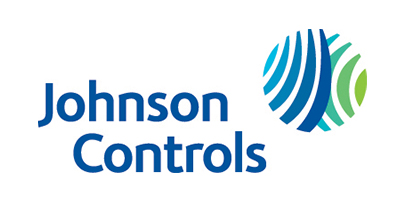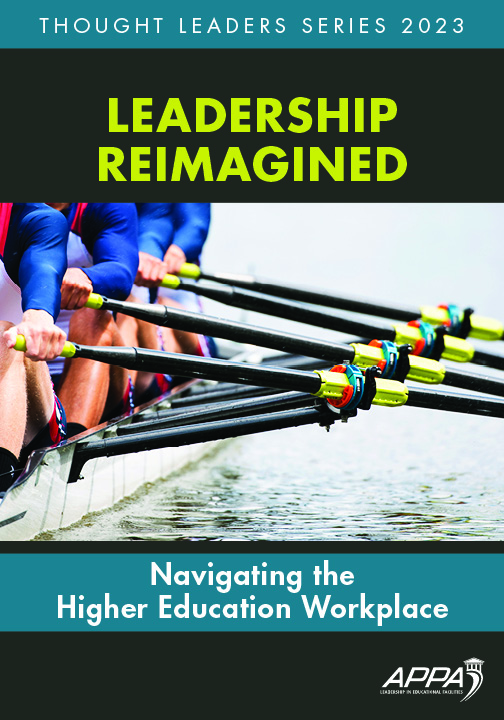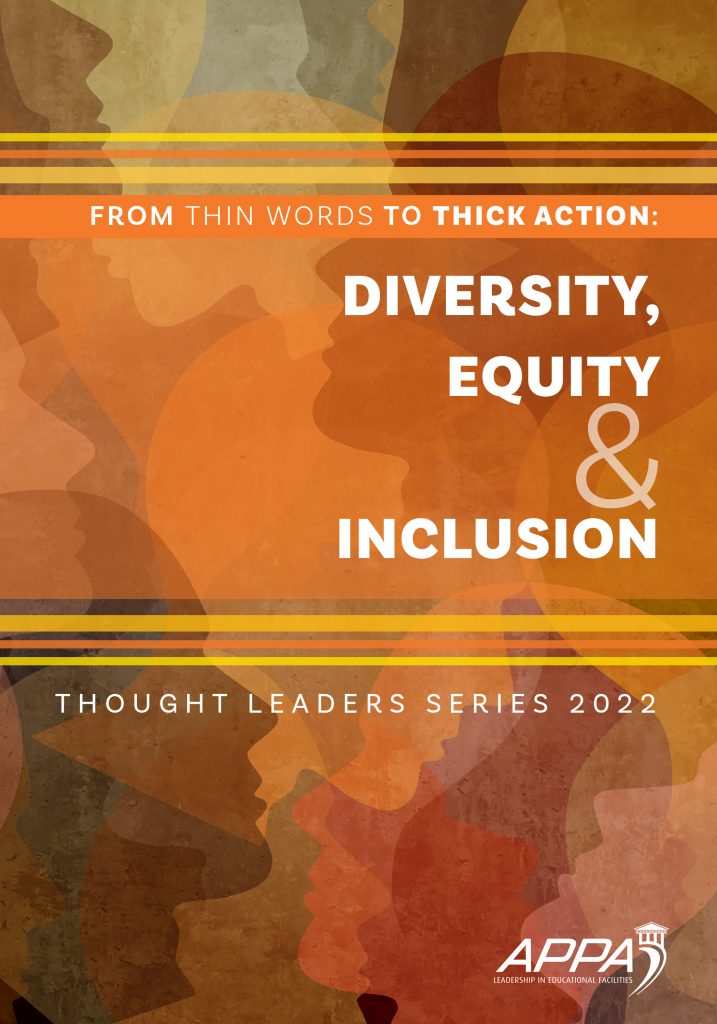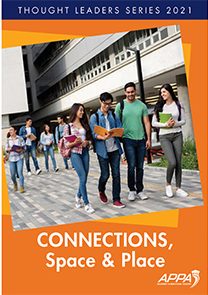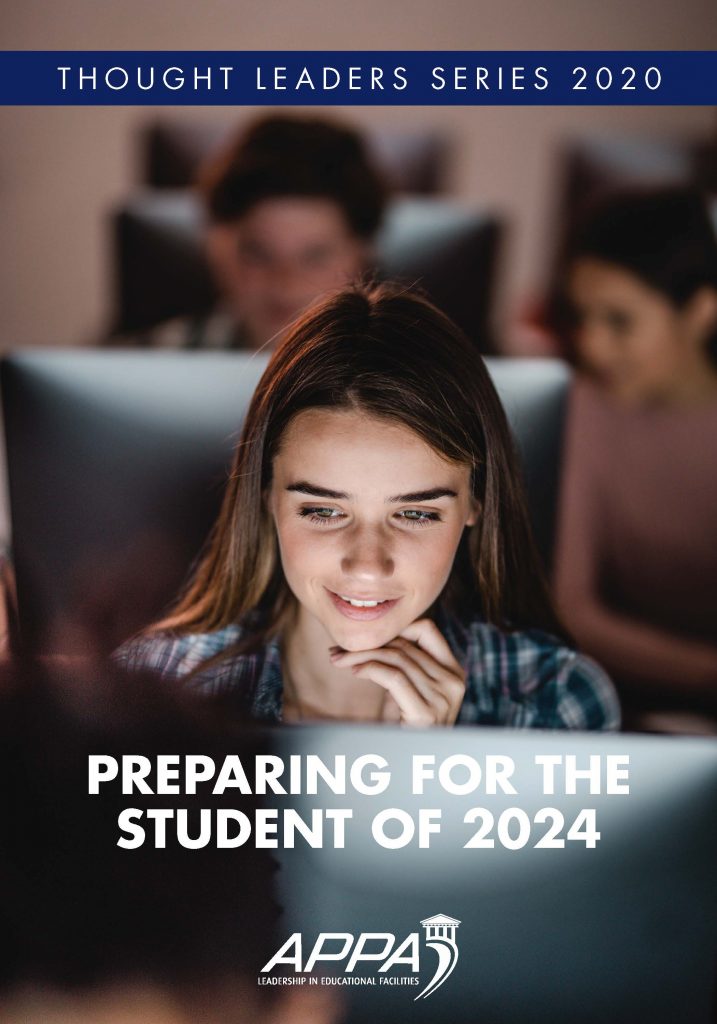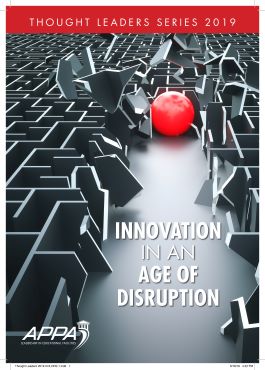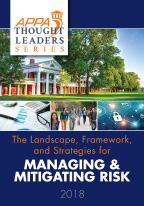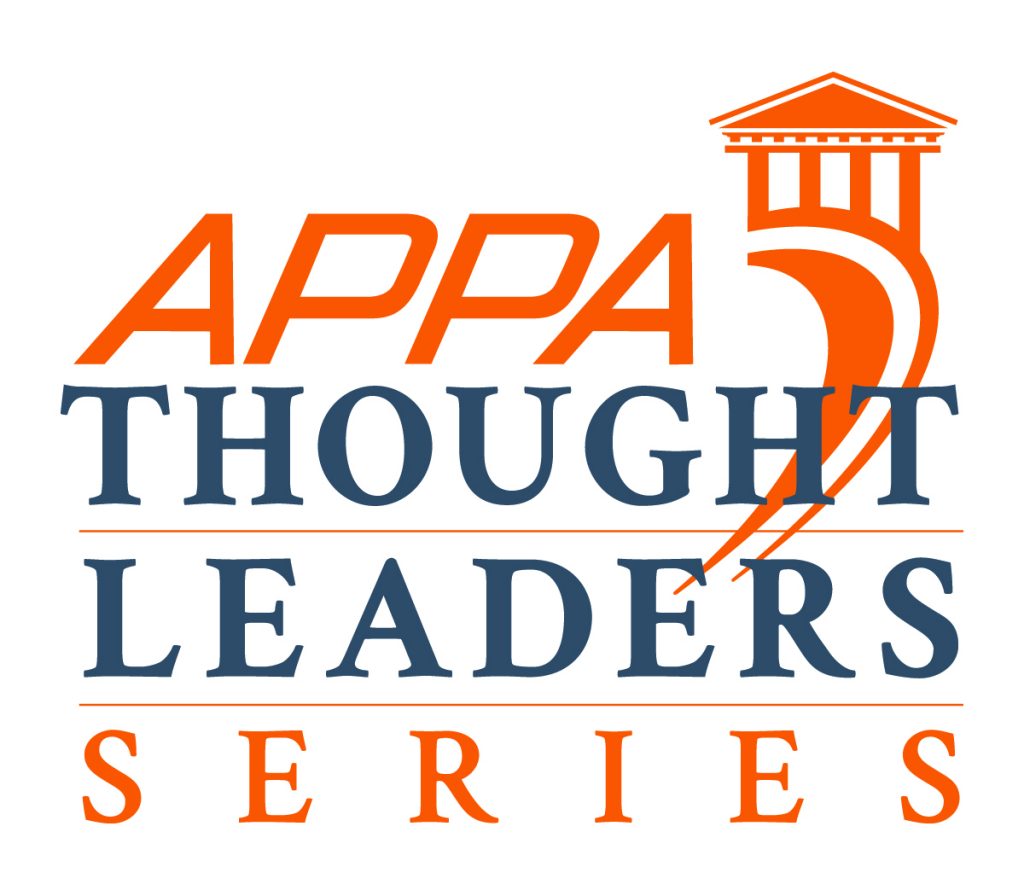
APPA developed the Thought Leaders Series to conduct dedicated discussions on the future of higher education and the impact of that future on educational facilities. The annual Thought Leaders Symposium convenes representatives of colleges and universities from across the United States and Canada alongside association leaders, industry consultants, and education experts. Thought Leaders reports are free to APPA members, thanks to the generosity of our sponsors, and may be downloaded from the APPA Bookstore.
2024 Thought Leaders Report:
The Campus of 2030: Risks and Opportunities
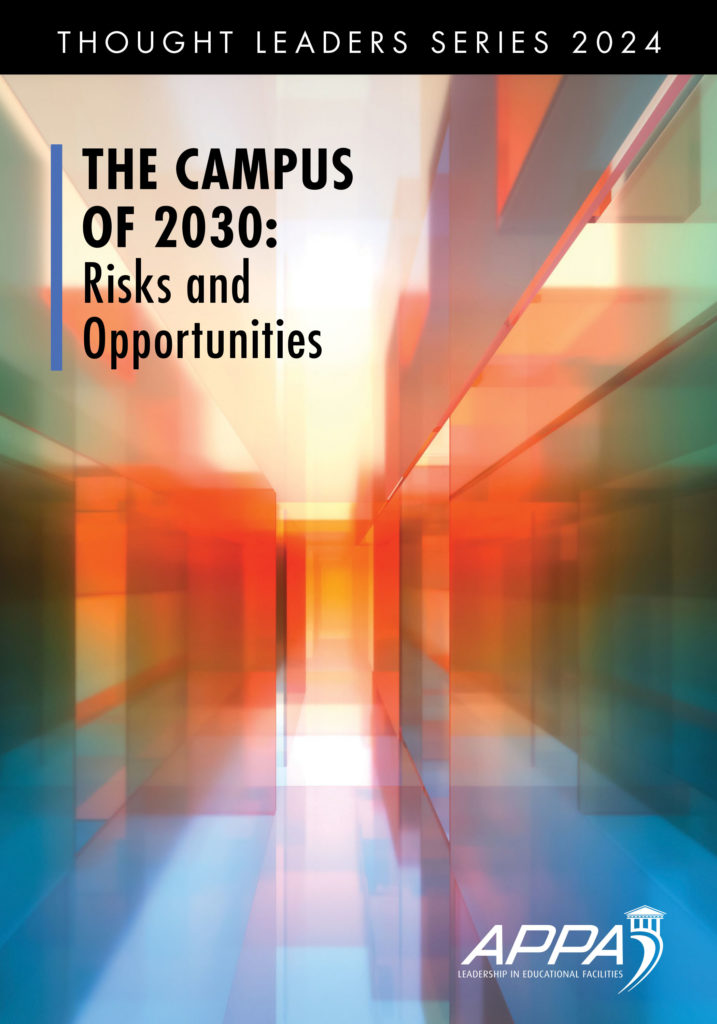
Higher education is constantly transforming, but the rate of change accelerated dramatically over the previous decade. APPA’s 2024 Thought Leaders Report, The Campus of 2030: Risks and Opportunities, provides campus facility leaders with insights into what that future campus will look like, who will attend it, and how it will operate. The remaining years of this decade will not be easy for already stressed faculty and staff. Still, marshaling forces and adapting to technology and the new higher education environment will help them get there.
Thanks to the generosity of our sponsors, Johnson Controls and Siemens, the Thought Leaders reports are free and can be downloaded from the APPA Bookstore.
The 2023 Thought Leaders report, Leadership Reimagined: Navigating the Higher Education Workplace, provides leaders with information and tools to help you lead your employees through the continuing uncertainty with a focus on the workforce. The authors recognize that workforce issues are incredibly challenging and understand that an engaged and empowered workforce can find solutions to these overwhelming campus problems, creating an opportunity to shape the institution’s future and cement our role as well.
A major theme throughout the symposium and this report is the significance of leadership that now requires a shift in mindset. To develop a clear picture of the situation confronting leaders at colleges and universities, the Thought Leaders symposium began with a SWOT analysis, looking at the strengths, weaknesses, opportunities, and threats facing campus leaders.
The 2022 Thought Leaders report, From Thin Words to Thick Action: Diversity, Equity & Inclusion, focuses on today’s demands for truly inclusive institutions, and that diversity, equity, and inclusion (DEI) are rooted in the deepest-held values of higher education: excellence, integrity, respect, responsibility, and community. Yes, DEI benefits the institution by increasing innovation, boosting productivity, and preparing students for a global economy. A classroom of students from diverse backgrounds with a variety of life experiences is an electric environment, snapping with energy and ideas. But DEI isn’t a priority because someone ran a cost-benefit analysis and diversity came out with a higher ROI. APPA values diversity, equity, and inclusion because it is the right thing to do.
The 2021 Thought Leaders report, Connections, Space and Place, focuses on the “sense of place,” defined by one expert as “the feelings evoked among people as a result of the experiences and memories they associate with a place and the symbolism they attach to that place.” Meaningful places can come to represent an entire institution, including its history, its values, and its legacy. A strong sense of place can arise naturally, but it can also be consciously, carefully cultivated. This is possible for any institution, no matter its age or classification. Historic campuses with well-established places and traditions may find this process easier, but even new campuses and recently established institutions can foster a sense of place. Colleges and universities should look for the places where the community naturally gathers—a quad, a fountain, a lounge, a stairway—and take steps to make that place welcoming and accessible.
The 2020 Thought Leaders report, Preparing for the Student of 2024, focuses on students entering higher education in the next decade, being the most diverse incoming class in higher education history—and the vanguard of an increasingly diverse generation. They will have been raised with technology from birth and will consider online interaction as natural as breathing. They will be alert to the importance of mental health and wellness, both in themselves and in their peers. They will have low tolerance for slow administrative processes. They will expect their professors to teach in engaging, interactive ways and make smart use of technology. They will expect a lot of themselves. They will expect a lot of their institutions. They will know what they are paying for their education, and they will demand every penny’s worth. Is today’s campus ready for these students? The answer: yes—and no. Higher education is moving in the right direction, but it faces unprecedented demands and challenges. Facilities management leaders are only now beginning to understand that the old normal is never coming back. We must find ways to adapt to a new normal and a new set of expectations from our future students.
The 2019 Thought Leaders report, Innovation in an Age of Disruption, addresses the fact that few higher education institutions are truly embracing innovation in the face of adaptive challenges. How do you think outside the box? In other words, how do you approach thinking differently about the world around you and your institutional and organizational challenges? More importantly, how do you go beyond just thinking differently to actually seeing things differently? Contents include:
* Key takeaways about innovation and entrepreneurship
* Common approaches to higher education challenges
* Using innovation and entrepreneurship to tackle adaptive challenges
* Applying an innovative and entrepreneurial mindset to higher education’s adaptive challenges
* Applying those mindsets to higher ed facilities’ adaptive challenges
* Questions for campus discussion
* Resources for further reading
The 2018 Thought Leaders report, The Landscape, Framework, and Strategies for Managing & Mitigating Risk, looks at enterprise risk management (ERM) from both a campus-wide perspective as well as how risks affect the facilities organization in its support of the institution. In assessing all types of risks to the institution–strategic, financial, operational, compliance, and reputational–the Thought Leaders symposium participants identified six major risk areas that must be considered for their campuses:
* Revenue and investments
* Brand and reputation
* Health and safety
* Innovation
* Facilities
* Changing political/cultural environment
 Create an Account
Create an Account
 Login/myAPPA
Login/myAPPA
 Bookstore
Bookstore
 Search
Search  Translate
Translate 